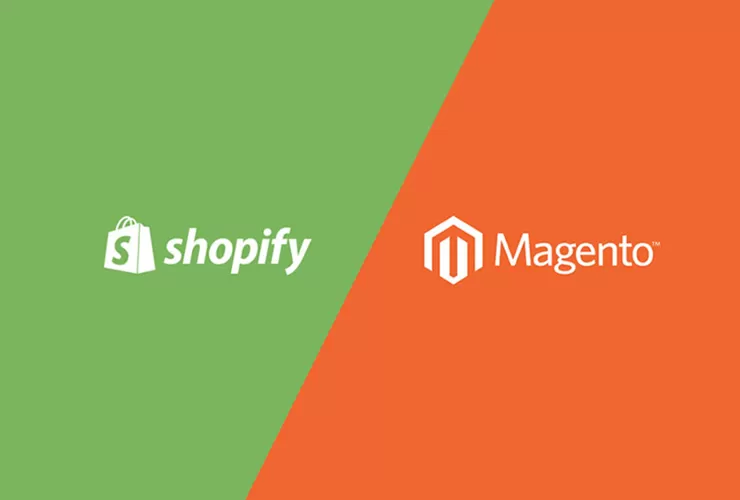When building an online store, choosing the right eCommerce platform is essential for success. Shopify and Magento are two of the most popular platforms, each with its unique strengths. This article compares Shopify and Magento to help you decide which is the best fit for your eCommerce website.
Overview of Shopify and Magento
Shopify is a fully hosted eCommerce platform that offers an all-in-one solution for building and managing online stores. It’s known for its user-friendly interface, extensive app ecosystem, and reliable hosting. Shopify is ideal for entrepreneurs and small to medium-sized businesses that want a hassle-free setup and maintenance process.
Magento is an open-source eCommerce platform that provides unparalleled flexibility and customization. It’s widely used by large enterprises and businesses with complex needs. Magento is available in two versions: Magento Open Source (free) and Magento Commerce (paid), both offering a robust set of features for building a scalable online store.
Key Differences Between Shopify and Magento
1. Ease of Use
- Shopify: Shopify is designed with ease of use in mind. Its drag-and-drop builder, intuitive dashboard, and pre-built templates allow even beginners to set up a store quickly. With Shopify handling hosting, security, and updates, users can focus on growing their business rather than managing technical details.
- Magento: Magento offers unmatched flexibility but at the cost of a steeper learning curve. Setting up a Magento store requires technical knowledge, especially for customizations. It’s best suited for developers or businesses with dedicated IT teams who can manage the platform’s complexities.
2. Customization and Flexibility
- Shopify: Shopify offers a variety of themes and apps to customize your store. However, its customization options are somewhat limited compared to Magento. You can make changes through the Shopify editor, but more advanced customization may require knowledge of Shopify’s Liquid code.
- Magento: Magento shines in customization and flexibility. It allows for deep customization of every aspect of your store, from design to functionality. Businesses can create a unique shopping experience tailored to their specific needs, but this often requires a skilled developer.
3. Performance and Scalability
- Shopify: Shopify is a hosted solution, meaning it handles all the hosting, performance optimization, and security for you. It’s designed to scale with your business, accommodating growing traffic and product catalogs without compromising performance.
- Magento: Magento is highly scalable and can handle large volumes of traffic and complex product catalogs. However, since it’s self-hosted, you’ll need to invest in powerful hosting solutions and ongoing optimization to maintain performance as your store grows.
4. Cost
- Shopify: Shopify operates on a subscription model, with pricing tiers that vary based on the features and services included. While the monthly fees are straightforward, additional costs can arise from using premium themes, apps, and transaction fees on certain payment gateways.
- Magento: Magento Open Source is free, but you’ll need to pay for hosting, security, and any third-party extensions or custom development work. Magento Commerce is a premium version with advanced features, but it comes with a substantial licensing fee, making it more suitable for large enterprises.
5. Security
- Shopify: Shopify provides robust security features, including SSL certificates, PCI compliance, and regular updates to protect your store from vulnerabilities. As a hosted solution, Shopify takes care of all security measures, giving you peace of mind.
- Magento: Magento offers strong security features but requires more hands-on management. You’ll need to implement security patches, monitor for vulnerabilities, and ensure compliance with industry standards. This makes Magento a better choice for businesses with the resources to manage their own security.
6. Community and Support
- Shopify: Shopify has a large, active community and offers 24/7 customer support through various channels, including live chat, email, and phone. The platform also provides extensive documentation and a thriving app marketplace for additional functionality.
- Magento: Magento has a strong developer community and extensive documentation. Support for Magento Open Source primarily comes from the community or through paid developers. Magento Commerce users have access to professional support from Adobe (Magento’s parent company), but this comes at a higher cost.
Which Platform Should You Choose?
The choice between Shopify and Magento depends on your business size, technical expertise, and growth aspirations:
- Choose Shopify if you want a user-friendly, all-in-one platform that takes care of hosting, security, and updates. It’s ideal for small to medium-sized businesses or entrepreneurs looking for a quick and easy way to start selling online without needing technical skills.
- Choose Magento if you need a highly customizable and scalable platform that can handle complex business requirements. Magento is best for larger businesses with the resources to manage their own hosting, security, and development needs.
Shopify and Magento both provide powerful eCommerce solutions, yet they cater to different types of businesses. If you’re looking for simplicity and ease of use, Shopify shines as the ideal choice. On the other hand, Magento suits businesses that need advanced customization and scalability. By understanding the unique strengths and limitations of each platform, you can make an informed decision that positions your online store for success. Ultimately, selecting the right platform will help you create a seamless shopping experience for your customers and effectively support your business goals.














